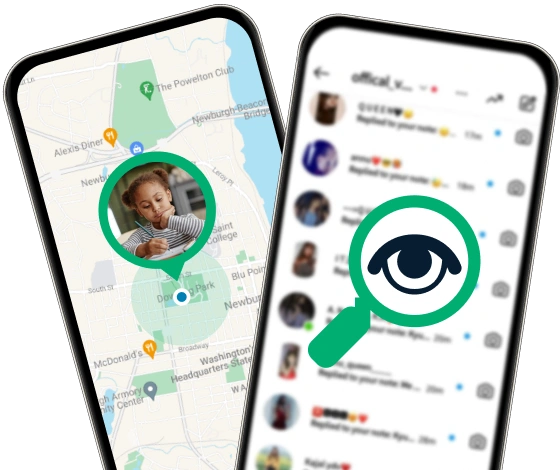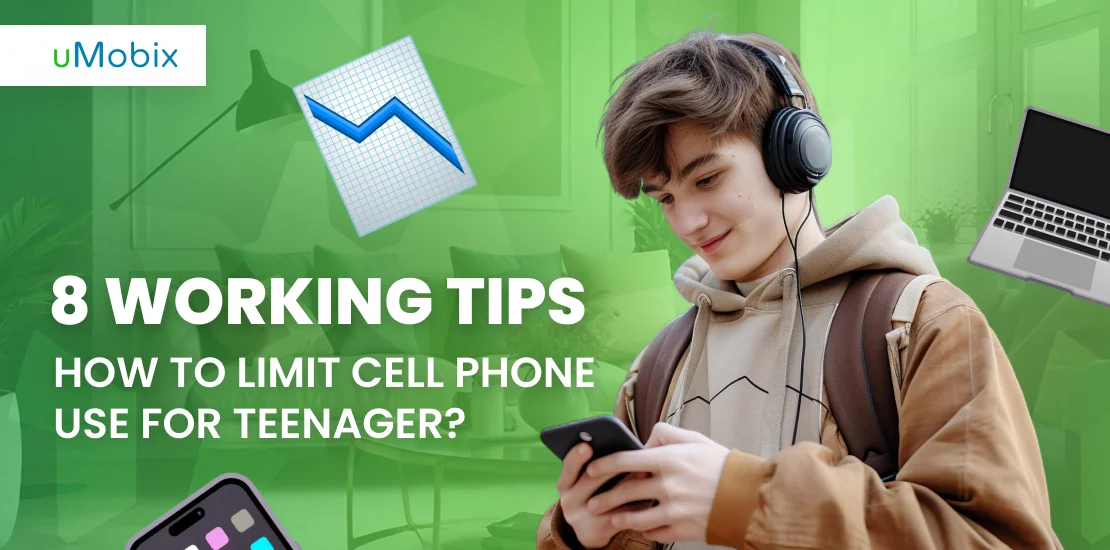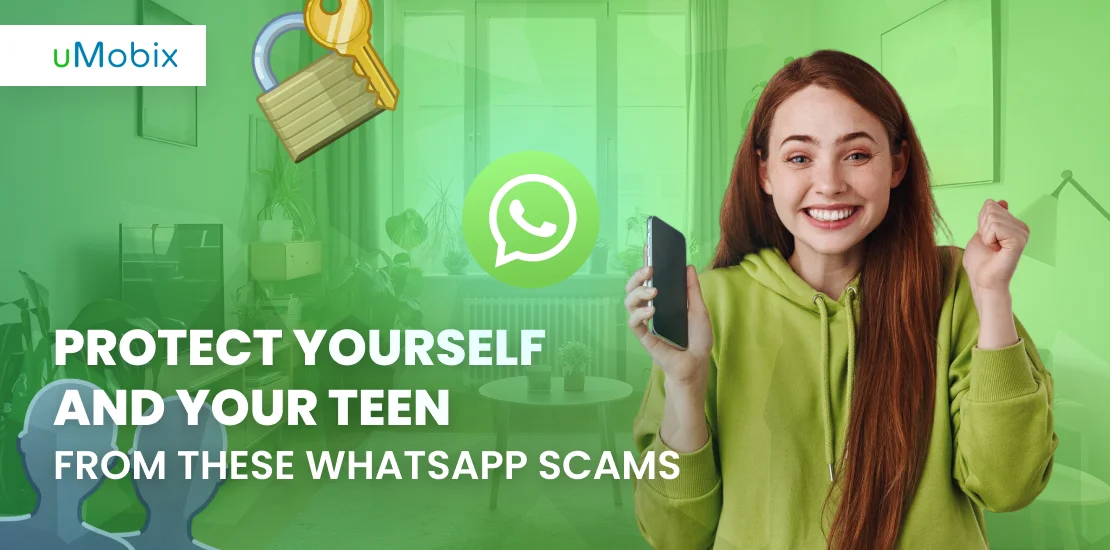Does your kid spend too much time on their cell phone watching videos, playing games, or chatting with friends? Do they ignore your requests and demand permission to use their phone? Well, it won’t do. While being supportive is important, remember that your primary role is to be their parent, not just their friend.
Although everyone will agree that technology is a necessary part of most teens’ education and social lives, that doesn’t mean there aren’t consequences to unlimited screen time. So, how to limit cell phone use for teenager, and what are the consequences if you ignore your teen phone addiction? That is what we will discuss in this article.
Teen Phone Addiction
According to the American Academy of Child & Adolescent Psychiatry 2024 report, kids and adolescents spend too much time on their cell phones, games, computers, TVs, and tablets. The research showed that an ordinary teenager on phone spends X2 times more time on their screens – up to 9 hours/day – compared to children aged 8-12, who spend 4-6 hours a day. What does it mean? It means a typical teenager spends approximately 63 hours/week, 252 hours/month, and 3024 hours/year on their phone.
As per the National Library of Medicine, one of the reasons for significant screen time use was the COVID-19 pandemic, when many experienced lockdowns. Even though the pandemic has now been classified as endemic and most activities have returned to normal, many adolescents still have increased screen time because of habits developed during the lockdowns. It has led to many negative consequences, such as poor sleeping habits, stress, and anxiety, to list a few.
Risks of Teen Phone Addiction
So, what are the teen phone addiction risks? Here, we’ve mentioned the most common ones every parent should know about before buying their kids a cell phone:
- Increased risk of anxiety and stress: Kids are everywhere, but those who are at their teen ages spend most of their time on social media platforms and online games. As per recent studies, adolescents who spend most of their time on Facebook and Instagram were shown to have a substantially (13-66%) higher rate of reported social media depression than those who spent the least time. What is worse, they can experience stress due to constant online engagement and social comparison with other people (we all know how it can be difficult to watch those idealized “Pinterest-like” stories and photos), which leads to feelings of inadequacy and can make teens question why their own lives don’t measure up.
- Sleep disorders: Teens can chat with peers under the blanket even if it’s bedtime and you ask them to turn their cell phones off. As a rule, the time passes so quickly that they cannot even notice that they’ve spent half of the night online. The result? Fatigue and poor academic performance.
- Offline communication problems: As teens spend more time online, they may have difficulties with face-to-face interactions and relationships with classmates, schoolteachers, friends, and even family members. Kids can be unkind. If they notice your kid has communication difficulties, it may lead to increased bullying or trolling.
- Physical health issues: A teenager on phone frequently experiences the following health issues: dry eyes, poor posture, and a sedentary lifestyle, leading to even more serious health problems.
- Communication with strangers: Teens, sooner or later, start using online chat rooms (when playing games) or special forums for chatting with peers. However, frequently, because of their naivety, they become victims of online predators, psychics, or pedophiles.
When Is It Enough?
Child Mind Institute says Beth Peters, PhD, a clinical psychologist in Westminster, Colorado, who specializes in teens and families, meets a teen who conflicts with their parents because of their cell phone use every week. Beth claims that online communication cannot give kids everything they need for everyday communication with people: face-to-face communication and understanding body language, mimics, intonation, etc. They may have difficulties distinguishing when people talk with sarcasm/irony and when they don’t – the most important aspects of conversational skills that, in turn, form personality.
Therefore, many experts recommend teenage mobile phone rules, restricting phone access to kids and other family members. For example, parents can set weekends aside when no one uses their cell phones and everyone is engaged in real-life communication. Ask your kids how they’re doing at school and what’s new in their lives. Encourage them to play offline games and consider spending free time with friends.
When Is It the “Right” Time for You to Interfere?
So, why do parents take away phones, and when is the best time for you to step in and restrict access to your kid’s cell phone use? There is no universal answer here. However, as soon as you notice the first signs that your kid starts using their cell phone more and more or prioritizes online communication over offline, you should immediately act.
Many kids are savvy about using social media, like presenting themselves positively for college on Facebook or managing multiple Instagram accounts for personal or portfolio use. Most of them use social media to present themselves and their work, such as photography or artwork. These platforms allow them to showcase their creativity and talents, often to a selected audience of approved followers.
Here are different social media platforms and the percentage of U.S. adolescents who have used them. Parents can be on their kid’s friend lists, which will enable them to see the content they share with other users. However, it does not guarantee they won’t hide anything from them.
Why Do Parents Take Away Phones? Is It a Good Idea to Prevent Teen Phone Addiction?
Traditional parenting often relied on punishing kids for misbehavior, hoping it would make them think twice before repeating the same mistakes. However, it works differently. Some kids may become more hidden and think about all possible ways to be sneakier.
According to a CMC report, “52% of teens sit for long periods in silence, on their smartphones, while hanging out with friends”. They also state that teens who spend five or more hours a day on electronic devices are 71% more likely to show signs of suicide risk compared to those who only spend an hour a day on their devices. Is it scary? Yes, it is. Therefore, parents should do their best to prevent or get rid of teen phone addiction.
You must consider taking away your kids’ cell phones if you notice them accessing or sharing inappropriate content or spending too much time online. For example, if your child spends too much time on Instagram, you can delete the app from their device and restrict them from reinstalling it for a certain period. However, remember to be careful: it’s not always the best approach. If the phone is taken away for too long or too frequently, it might lead to frustration or resentment rather than positive change.
So, how to limit cell phone use for teenager then? A better approach is setting clear phone use boundaries, like limiting screen time, avoiding certain apps, and encouraging breaks to help your child develop healthy phone habits without needing harsh punishments. This is possible via parental control apps, with uMobix offering all the above features.
How to Limit Cell Phone Use for Teenager and Not Become Their Enemy?
So, to protect your kid and set clear boundaries, you as a parent have to set certain teenage mobile phone rules. But how can you do this without making them see you as the enemy?
Use uMobix Cell Phone Monitoring Tool
If you want to monitor your kid’s online activities without them knowing, the best way to do it will be a special monitoring app installed on their device. One of the best choices available on the market today is uMobix. The app’s cell phone tracking features include, but are not limited to:
- Remote control: Enables you to set screen time limits, block apps, restrict websites, or block WiFi.
- Applications time record: The app will record the time your kid spends when using each app installed on their smartphone.
- GPS location tracking: Provides real-time location data.
- Calls/SMS/MMS monitoring: Lets you monitor their calls, text messages, and multimedia messages. Also, you will be able to block restricted calls if needed.
- Social media and IM monitoring: Gives access to text messages sent through social media platforms and instant messaging apps, such as Instagram, Facebook, Tinder, Viber, Twitter, Telegram, Snapchat, and WeChat.
- Web browser history checking: Allows you to review the websites your child has visited.
- Audio/video streaming: You can listen to your teenager on phone and see with whom they are close to in real-time.
How to limit cell phone use for teenager with uMobix?
- Visit the uMobix website and sign up.
- Select the most suitable subscription plan and proceed with payment.
- Tag their device and follow on-screen instructions to download and install the app successfully.
- Log into your uMobix account on any device and view the dashboard. You can block/delete unwanted apps, restrict access to harmful websites, block WiFi access, restrict calls or messages, and more. All controls are on the left.
The best part about this app is that your kid will not consider you a toxic parent. uMobix works in stealth mode, meaning everything it does is hidden from your child.
Set Boundaries and Follow Them Together
Establishing smartphone rules together with your teen helps build mutual respect and understanding. But how to limit cell phone use for teenager without stress? Start with discussing your concerns and listening to their perspective. Collaboratively set clear guidelines for phone use, including screen time limits and app restrictions. Also, try to follow them yourself, as otherwise, it may not work for your kid.
Limit Screen Time
Decrease cell phone time use to 30 minutes before bedtime – this will help them fall asleep faster and have a healthier sleep. If you notice they want to do something to dissipate, give them an interesting book or read it yourself. It will not only feed their brain but also help the body to rest.
Let Them Know the Consequences of Phone Addiction
Kids must understand why they are not allowed to access their cell phones before bedtime or why you have set screen time limits throughout the day. Explain to them the consequences of phone addiction and how negatively it can impact their overall well-being. Teens need to understand that what you do is not a punishment but a way to protect them from problems that may happen to them if they ignore your requests.
Family Time Without Phone
Set aside family time without phones to build stronger connections. Make meals and family activities phone-free. This way, everyone can really “talk face to face” and enjoy each other’s company without digital distractions.
Avoid Multitasking
How to limit cell phone use for teenager with multitasking avoidance? Teens frequently think they can do two or more tasks simultaneously, e.g., do homework and chat with friends online. If your child has a phone, you have already been familiar with this problem and probably heard their reasons for multitasking. Your goal here is to encourage them to focus on one task at a time and explain how multitasking can make them less productive.
Phone-Free Days
As mentioned earlier, you have to think about the days all your family members will be free from their cell phones. It helps everyone focus on each other and enjoy quality time together without digital distractions.
Include Sports
Physical activity is great, especially for a teen with much energy. It helps them use their energy positively, boosts their mood, and keeps them away from screens. It would be better if your kid has a passion for sports than an addiction to cell phone use.
Teenage Mobile Phone Rules: Checklist for Parents
So, how to limit cell phone use for teenager? What are the main rules every parent should know about? Here are some of the most important ones that you must discuss with your child before you give them a cellphone.
- Texting: Be respectful to both the people you text and those who text you. Also, know that sharing personal information is dangerous, even if it is shared with your closest friends.
- Taking/sharing photos: If you take someone’s phone, ask for permission. The same thing is when sharing their photos through DMs or publicly. Moreover, never share private photos with strangers.
- Calls: Check the cell phone numbers and only respond to those you know.
- Apps: Apps, games, and in-app upgrades can cost money. Follow your family’s rules for buying and downloading, and be aware that parental controls might block some content and purchases.
- Websites: Never visit websites that involve age-inappropriate or harmful online content. It can negatively impact your mental health.
- Posting: Do not post your private data, like tagged photos or locations. Strangers are everywhere, it’s better to avoid the risk of facing one of them in real life.
Be sure to explain to your child when and how often they can use their cell phone. Set screen time rules and choose days for them to be device-free. Spend more time together and include sports in their routine. This approach will help achieve the best results.
Conclusion
The teenage years offer so many exciting opportunities. It’s one of the best times in their life. It would be a pity if they spent most of their time glued to their phone. So, now that you know how to limit cell phone use for teenager, your task would be to encourage them to engage in meaningful activities that contribute to their growth and happiness. uMobix parental control app will be your reliable companion along that path, allowing you to limit cell phone use in a healthy way.





